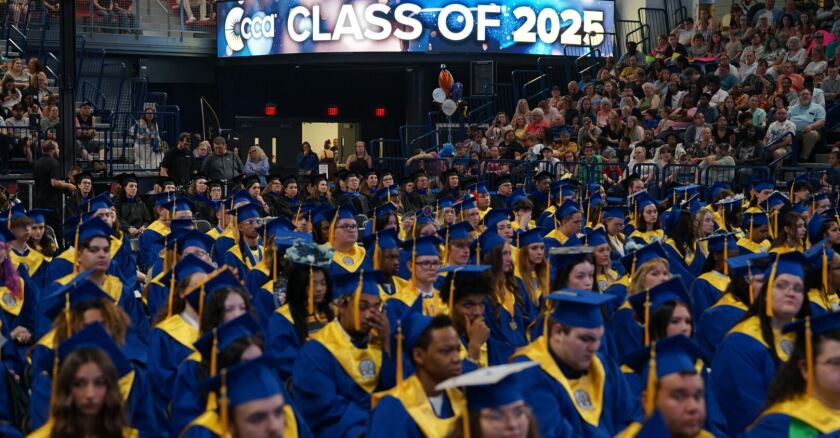Science
Pennsylvania’s Cyber Charter Funding Debate Heats Up Amid Budget Talks

The funding structure for cyber charter schools in Pennsylvania is under intense scrutiny as budget negotiations unfold in Harrisburg. Governor Josh Shapiro and legislative leaders are deliberating over proposals that could significantly impact property taxes and local school quality. A key proposal aims to reform how these schools are funded, with the potential to save local districts approximately $250 million.
Currently, cyber charter schools receive funding from both local and state tax revenues, which are allocated through local school district budgets. In June, the Democratic-led House of Representatives passed a bill that would cap tuition at $8,000 per student. This move, however, attracted support from only two Republican lawmakers, raising questions about its future in the Republican-controlled Senate.
Funding Disparities and Controversies
Proponents of the bill argue that cyber charters are financially well-off, with claims of mismanagement and wasteful spending. During hearings held by the House Education Committee, Rob Gleason, president of the Westmont Hilltop School Board, described the surplus generated by cyber schools as “criminal.” He criticized their funding, pointing out that they do not incur costs for services like school lunches or nursing staff.
Conversely, some Republican lawmakers contend that the proposed 20 percent funding cut threatens school choice for the approximately 70,000 students attending cyber schools. Roman Kozak, a Republican representative and former cyber school teacher, emphasized the unique expenses associated with online education, including cybersecurity and student record security. “It’s not just jump on Zoom and have a class,” he stated.
In response to these disputes, PennLive conducted an analysis of financial data from the Pennsylvania Department of Education for both traditional public schools and cyber charter schools. This analysis, based on data from the 2023-2024 school year, suggests that many arguments surrounding funding reform are rooted in misconceptions.
Analyzing Funding Equities
The narrative that cyber charter schools receive only 70-75 percent of the funding allocated to traditional public schools is frequently mentioned. Yet, experts note that this figure does not account for additional funding provided for special education students, which can significantly alter the funding landscape. When all student categories are considered, cyber schools receive approximately 93 percent of what traditional schools get, according to PennLive’s calculations.
Funding calculations vary across the state, with each local district determining the tuition rate for charter schools based on its own spending per student. This results in numerous tuition rates, complicating the funding picture. Local districts can deduct certain expenses, such as building maintenance and student transportation, from the amounts they pay to charter schools. Critics argue these deductions are unfair, suggesting that cyber schools also incur building and transportation costs, including reimbursement for internet expenses.
Some lawmakers and education advocates argue that these deductions are insufficient and do not reflect the realities of online education. For instance, Michael Whisman, president of Vertex Education, indicated that the largest cyber school reimburses families up to $675 per student annually for internet access, which should be factored into funding discussions.
Moreover, the funding formula’s reliance on outdated assumptions regarding special education has led to inflated allocations for cyber schools, critics assert. Current regulations mandate that cyber charters receive funding for special education students based on flat rates, regardless of the severity of disabilities. This has created an incentive for cyber schools to enroll students with less severe disabilities, which undermines the goal of providing equitable education.
As the budget negotiations continue, the stakes are high for both traditional public schools and cyber charters. Lawmakers are considering adjustments to the funding formula, particularly regarding special education allocations, as they strive for a more equitable system. The outcome of this debate will have significant implications for educational funding and resource allocation across Pennsylvania.
Parents of students in cyber schools have expressed concerns about the adequacy of special education services provided by local districts, leading them to seek alternatives that better meet their children’s needs. Brian Hayden, CEO of PA Cyber, noted that many students enrolling in cyber schools already have Individualized Education Plans (IEPs) established by their previous public schools, highlighting the necessity for these alternative educational options.
As this contentious debate unfolds, both sides will continue to make their case for the future of cyber charter funding in Pennsylvania, with the potential for significant implications on local educational quality and taxpayer burdens.
-

 World3 days ago
World3 days agoCoronation Street’s Shocking Murder Twist Reveals Family Secrets
-

 Entertainment4 months ago
Entertainment4 months agoKate Garraway Sells £2 Million Home Amid Financial Struggles
-

 Entertainment3 months ago
Entertainment3 months agoAnn Ming Reflects on ITV’s ‘I Fought the Law’ Drama
-

 Health3 months ago
Health3 months agoKatie Price Faces New Health Concerns After Cancer Symptoms Resurface
-

 Entertainment3 weeks ago
Entertainment3 weeks agoCoronation Street Fans React as Todd Faces Heartbreaking Choice
-

 World4 weeks ago
World4 weeks agoBailey Announces Heartbreaking Split from Rebecca After Reunion
-

 Entertainment6 days ago
Entertainment6 days agoTwo Stars Evicted from I’m A Celebrity Just Days Before Finale
-

 World6 days ago
World6 days agoKevin Sinfield Exceeds Fundraising Goal Ahead of Final Marathons
-

 Entertainment3 months ago
Entertainment3 months agoCoronation Street’s Carl Webster Faces Trouble with New Affairs
-

 Entertainment3 months ago
Entertainment3 months agoWhere is Tinder Swindler Simon Leviev? Latest Updates Revealed
-

 Entertainment4 months ago
Entertainment4 months agoMarkiplier Addresses AI Controversy During Livestream Response
-

 Science2 months ago
Science2 months agoBrian Cox Addresses Claims of Alien Probe in 3I/ATLAS Discovery





















